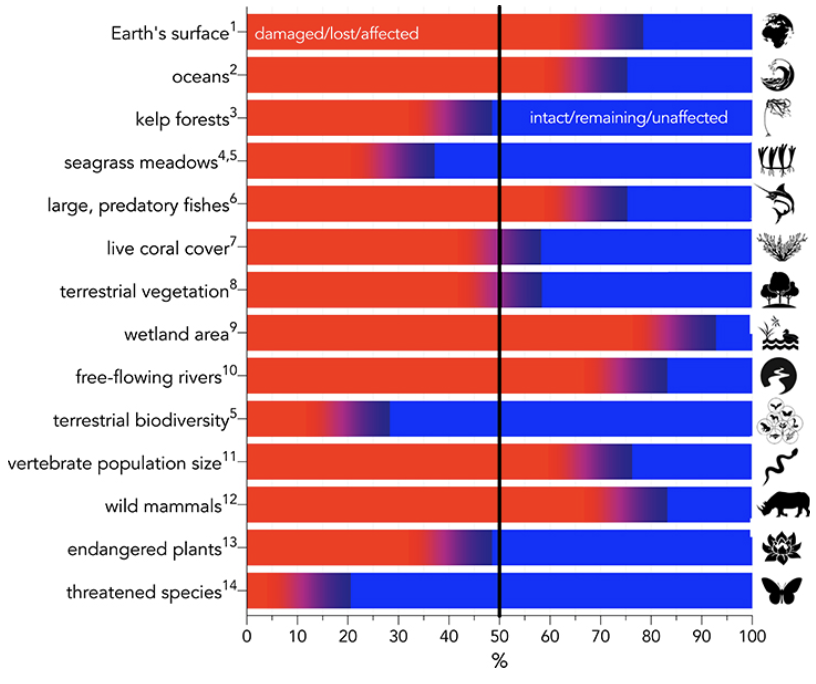Scientists' study shows evidence of mass extinction of planet's biodiversity

Rubryka
A group of 17 of the planet's leading scientists summarized today's state of flora and fauna to convey to politicians the seriousness of the catastrophic situation for the future of the earth and humanity.
In the scientific journal fronties, a study was published with loud statements about the global ecological catastrophe that awaits us in this century.
"Most people cannot realize the scale of the disaster and that they will suffer from the consequences of the destruction of the environment. The scale of the threats to the biosphere and all its lifeforms—including humanity—is, in fact, so great that it is difficult to grasp for even well-informed experts. The problem is exacerbated by ignorance and vested interests," says the lead author of the study, Professor Corey Bradshaw from Flinders University in Australia.
The authors of the scientific article summarized the forecasts regarding the deterioration of human health and a significant decrease in diversity, climate change, threats of mass migration, and competition for resources already in this century. Here are the main points.
Reduction of biodiversity.
This indicates the beginning of a mass extinction
Ecosystems of about 70% of the surface of our planet have been disturbed and changed by man. Since the beginning of agriculture about 11,000 years ago, the biomass of terrestrial vegetation has halved, and 20% of its original diversity has been lost forever. Another 20% of all species are threatened with extinction within the next few decades.

An infographic showing the percentage of biodiversity of different animals and ecosystems that have been destroyed or damaged by humans (in red) and the intact proportion (in blue) according to the "baseline," that is, what it should be without human intervention. Source fronties
❗️Such data indicate the beginning of mass extinction; this conclusion is stated in the study. Scientists now know about five such extinctions during the existence of our planet, the last of which was 66 million years ago.
Overpopulation of the planet.
There will not be enough resources to meet our needs
Of all the biomass on Earth today, the majority is represented by livestock (59%) and humans (36%), and only about 5% of this total biomass is wild mammals, birds, reptiles, and amphibians. By 2050, the world population is likely to grow to 9.9 billion. Eventually, this will lead to a need for so many resources that our planet will be unable to meet.
"There is no way—ethically or otherwise (barring extreme and unprecedented increases in human mortality)—to avoid rising human numbers and the accompanying overconsumption. That said, instituting human rights policies to lower fertility and reining in consumption patterns could diminish the impacts of these phenomena," the article states.
Global warming.
The latest climate models show a greater rate of warming in the future than previously predicted
Civilization has already exceeded global warming by ~1.0°C compared to pre-industrial conditions and is on track to cause at least 1.5°C of warming between 2030 and 2052.
The melting of permafrost and the release of stored methane will continue to increase greenhouse gas concentrations, further delaying the response to temperature decline, even if humanity stops using fossil fuels by 2030.
What is the solution?
"Yet, our goal is not to present a fatalist perspective because there are many examples of successful interventions to prevent extinctions, restore ecosystems, and encourage more sustainable economic activity at both local and regional scales," the scientists note in the conclusion to the article.
Scientists advise stimulating the development of organizations that care for the environment and offer the following solutions:
- Abolishing permanent economic growth
- Proper pricing
- A rapid shift away from fossil fuel use
- Strict regulation of markets and acquisition of property
- Empowerment of women
They also urge other scientists not to be indifferent:
"It is therefore incumbent on experts in any discipline that deals with the future of the biosphere and human well-being to eschew reticence, avoid sugar-coating the overwhelming challenges ahead and 'tell it like it is.' Anything else is misleading at best, or negligent and potentially lethal for the human enterprise at worst."



















































